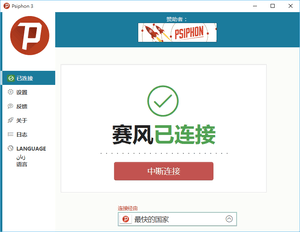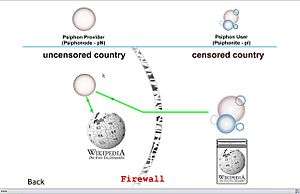Psiphon
Psiphon is a free and open-source Internet censorship circumvention tool that uses a combination of secure communication and obfuscation technologies (VPN, SSH, and HTTP Proxy). Psiphon is a centrally managed and geographically diverse network of thousands of proxy servers, using a performance-oriented, single- and multi-hop architecture.[1]
 | |||||||
 Psiphon on Windows 10 | |||||||
| Developer(s) | Psiphon, Inc., the Citizen Lab | ||||||
|---|---|---|---|---|---|---|---|
| Initial release | 2006 | ||||||
| Stable release(s) | |||||||
| |||||||
| Repository | | ||||||
| Operating system | Windows, Android, iOS | ||||||
| Size |
| ||||||
| Type | Internet censorship circumvention | ||||||
| License | GNU General Public License | ||||||
| Website | psiphon | ||||||
Psiphon is specifically designed to support users in countries considered to be "enemies of the Internet".[2] The codebase is developed and maintained by Psiphon, Inc., which operates systems and technologies designed to assist Internet users to securely bypass the content-filtering systems used by governments to impose censorship of the Internet.
The original concept for Psiphon (1.0) was developed by the Citizen Lab at the University of Toronto, building upon previous generations of web proxy software systems, such as the "Safe Web"[3] and "Anonymizer" systems.
In 2007 Psiphon, Inc. was established as an independent Ontario corporation that develops advanced censorship circumvention systems and technologies. Psiphon, Inc. and the Citizen Lab at the Munk School of Global Affairs, University of Toronto occasionally collaborate on research projects, through the Psi-Lab partnership.[4] Psiphon currently consists of three separate but related open-source software projects:
History

The original concept for Psiphon envisioned an easy-to-use and lightweight Internet proxy, designed to be installed and operated by individual computer users, who would then host private connections for friends and family in countries where the Internet is censored. According to Nart Villeneuve, "The idea is to get (users) to install this on their computer, and then deliver the location of that circumventor, to people in filtered countries by the means they know to be the most secure. What we're trying to build is a network of trust among people who know each other, rather than a large tech network that people can just tap into."[8] Psiphon 1.0 was launched by the Citizen Lab on 1 December 2006 as open-source software.[9]
In early 2007, Psiphon, Inc. was established as a Canadian corporation independent of the Citizen Lab and the University of Toronto. The original code (1.6) was made available under the GNU General Public License. In 2008, Psiphon was awarded the Netexplorateur award by the French Senate.[10] In 2009, Psiphon was recognized with The Economist Best New Media Award by Index on Censorship.[11] In 2011, Psiphon 1.X was officially retired and is no longer actively supported by Psiphon, Inc., or the Citizen Lab.[7]
In 2008, Psiphon, Inc. was awarded two sub-grants by the Internews operated SESAWE (Open Internet) project(s).[9][12] The source of funding came from the European Parliament and the US State Department Internet Freedom program, administered by the Bureau of Democracy, Human Rights, and Labor (DRL).[13] The objective of these grants was to develop Psiphon into a scalable anti-censorship solution capable of supporting large numbers of users across different geographic regions. The core development team grew to include a group of experienced security and encryption software engineers that previously developed Ciphershare, a secure document management system.[14]
In 2010, Psiphon, Inc. began providing services to the Broadcasting Board of Governors (US), US Department of State and the British Broadcasting Corporation. As of 2015, Psiphon, Inc. operated on the basis revenues generated from commercial operations.
In 2012, Psiphon, Inc. began development of a mobile version of Psiphon 3 for use with phones running Android.[15]
See also
Further reading
- Software jumps China's firewall for news from Tibet
- BBC: Web censorship 'bypass' unveiled
- Canadian software touted as answer to Internet censorship abroad
- Computerworld: Liberation software designed on basis of trust
- Reuters: Canada experts find path round Internet firewalls
- Al Jazeera's Listening Post story about psiphon on YouTube
- Index on Censorship – Psiphon wins Economist New Media award at Freedom of Expression awards 2009
References
- Fifield D., Lan C., Hynes R., Wegmann P., Paxson V. (2015-05-15). "Blocking-resistant communication through domain fronting". Proceedings on Privacy Enhancing Technologies 2015. doi:10.1515/popets-2015-0009.CS1 maint: uses authors parameter (link)
- "Archived copy". Archived from the original on 2012-04-12. Retrieved 2012-04-11.CS1 maint: archived copy as title (link)
- "SafeWeb's Holes Contradict Claims". Wired. 2002-02-12.
- Ronald Deibert (2009-05-02). "Psiphon Launch – Let the revolution begin!". Deibert.citizenlab.org. Retrieved 2012-12-12.
- "Psiphon-Inc/psiphon: Meta-repo with info about and links to Psiphon resources". GitHub. 2020-05-07. Retrieved 2020-06-24.
- "psiphon". Launchpad.net. Retrieved 2012-12-12.
- "Psiphon – Total Delivery Solution for the Censored Internet". Psiphon.ca. Retrieved 2012-12-12.
- Boyd, Clark (2004-03-10). "Bypassing China's net firewall". BBC News. Retrieved 2007-03-28.
- "Psiphon – Total Delivery Solution for the Censored Internet". Psiphon.ca. Retrieved 2012-12-12.
- "Psiphon, un logiciel anticensure, « Netxplorateur de l'année »" (in French). Rue89. 2008-02-14. Retrieved 2012-12-12.
- "FREEDOM OF EXPRESSION AWARD 2009 RECIPIENTS ANNOUNCED". Index on Censorship. 2009-04-21. Retrieved 2012-12-12.
- "is now offline". Sesawe.net. Retrieved 2012-12-12.
- "Promises We Keep Online: Internet Freedom in the Organisation for Security and Cooperation in Europe (OSCE) Region". State.gov. Retrieved 2012-12-12.
- "CipherShare – High Performance, Secure Document Management and Collaboration". Provensecuritysolutions.com. Retrieved 2012-12-12.
- "Psiphon – Total Delivery Solution for the Censored Internet". Psiphon.ca. Retrieved 2012-12-12.